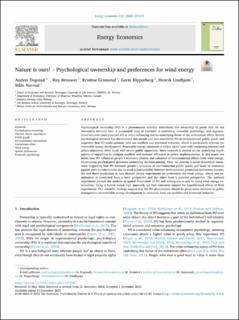| dc.contributor.author | Dugstad, Anders | |
| dc.contributor.author | Brouwer, Roy | |
| dc.contributor.author | Grimsrud, Kristine | |
| dc.contributor.author | Kipperberg, Gorm | |
| dc.contributor.author | Lindhjem, Henrik | |
| dc.contributor.author | Navrud, Ståle | |
| dc.date.accessioned | 2024-04-18T12:07:40Z | |
| dc.date.available | 2024-04-18T12:07:40Z | |
| dc.date.created | 2024-01-30T07:15:50Z | |
| dc.date.issued | 2023 | |
| dc.identifier.citation | Dugstad, A., Brouwer, R., Grimsrud, K., Kipperberg, G., Lindhjem, H., & Navrud, S. (2024). Nature is ours! - Psychological ownership and preferences for wind energy. Energy Economics, 129, 107239. | en_US |
| dc.identifier.issn | 0140-9883 | |
| dc.identifier.uri | https://hdl.handle.net/11250/3127262 | |
| dc.description.abstract | Psychological ownership (PO) is a phenomenon whereby individuals feel ownership of goods they do not necessarily formally own. A substantial body of literature in marketing, consumer psychology, and organizational sciences conceptualizes PO as value-enhancing and an underlying factor of the endowment effect. Recent psychological research has documented that people can also experience PO of environmental public goods and suggested that PO could generate land use conflicts and territorial behavior, which is particularly relevant for renewable energy development. Renewable energy represents a critical social issue with competing interests and policy objectives, often faced with severe public opposition. More research is needed on the underlying mechanisms of opposition to mitigate conflicts and increase efficiency in policy implementation. In this paper, we assess how PO influences people’s economic choices and valuation of environmental effects from wind energy, illuminating psychological processes underlying decision-making. First, we provide a novel theoretical framework suggesting that PO increases people’s valuation of environmental public goods and leads to resistance against their transformation due to weak substitutability between environmental protection and money income. We test these predictions in two discrete choice experiments on preferences for wind energy, where one examination is conducted from a local perspective and the other from a national perspective. The national experiment permits the analysis of spatial dimensions of PO and willingness to pay to avoid wind energy externalities. Using a hybrid mixed logit approach, we find consistent support for hypothesized effects in both experiments. Our scientific findings suggest that the PO phenomenon should be given more attention in public management of renewable energy development to overcome land use conflicts and territorial behavior. | en_US |
| dc.language.iso | eng | en_US |
| dc.publisher | Elsevier | en_US |
| dc.rights | Navngivelse 4.0 Internasjonal | * |
| dc.rights.uri | http://creativecommons.org/licenses/by/4.0/deed.no | * |
| dc.title | Nature is ours! – Psychological ownership and preferences forbwind energy | en_US |
| dc.type | Peer reviewed | en_US |
| dc.type | Journal article | en_US |
| dc.description.version | publishedVersion | en_US |
| dc.rights.holder | The authors | en_US |
| dc.subject.nsi | VDP::Samfunnsvitenskap: 200 | en_US |
| dc.source.volume | 129 | en_US |
| dc.source.journal | Energy Economics | en_US |
| dc.identifier.doi | 10.1016/j.eneco.2023.107239 | |
| dc.identifier.cristin | 2237806 | |
| dc.relation.project | Norges forskningsråd: 319917 | en_US |
| dc.relation.project | Norges forskningsråd: 308789 | en_US |
| dc.relation.project | Norges forskningsråd: 267909 | en_US |
| cristin.ispublished | true | |
| cristin.fulltext | original | |
| cristin.qualitycode | 1 | |

